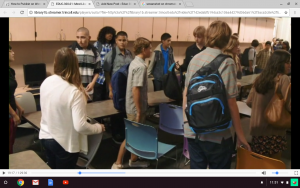The opening scenes of “Most Likely to Succed”, Greg Whiteley’s 2015 documentary, show us the extent to which artificial intelligence is taking over our lives, and how much our capabilities and skills are at increasing risk of being substituted by technology. The purpose of this message is to prove the need of a new type of schooling, one that could effectively prepare individuals to compete in an evolving and changing world, where being able to showcase certain skills is more relevant than having an impeccable hisory of school’s test scores.
To make his point clear, Whiteley focuses the content of his documentary on High Tech High, a charter school in San Diego, California. This school embraces the idea behind John Dewey’s quote at the very beginning of the documentary: “If we teach today as we taught yesterday, we rob our children of tomorrow” (00:15). The structure and curricula of schools have not made enough adjustments throughout the years, and as a result today we have an overall obsolete type of schooling that does not satisfy the requests of our modern society. High Tech High takes a different approach to teaching, placing more emphasis on practical skills like collaboration and creativity, with a milder focus on curriculum and classic classroom structure. Lessons are more student-centered compared to the teacher-centered methods mostly present in other schools. There is no school bell and periods are not strictly structured. Teachers are hired on annual contracts but they have more freedom in choosing what to teach and how to teach it. Besides promoting more collaboration between students, teachers also tend to work together and to cooperate. Students are required to submit small papers and homework during the semester, however, their work is ultimately judged based on a project that they put together at the end of each term. The creation of this project trains students to work together and serves the purpose of preparing them for the demands of the real world marketplace.

The above scene shows students getting ready for a Socratic Seminar. They have little to no instructions from their teacher and they appear disoriented and confused. From this moment, at the very beginning of the school year, students are exposed to this new concept of cooperation and communication. They have to figure out what to do on their own and they have to learn how to be proactive and engaged in school work in a new way. The importance of this scene is in the fact that the documentary shows a dramatic change in their attitude between the beginning of the semester and the end of it. Students’ behavior truly showcases improvements in their attitudes and confidence, and shows us completely new personalities that appear to be more ready and fit for our competitive world.
Despite the reasoning and the motifs behind this new/experimental type of schooling, geared towards readiness and success in life, there is still a good amount of skepticism around it. Parents are scared to move away from a more traditional type of schooling that measures success on the base of grades and test scores. The main fear is to compromise their child’s chances of getting accepted into a good college. Surprisingly, some students in tradional schools also show their reluctance toward this new teaching approach, expressing an immediate concern about grades and academic success, rather than a more future-oriented worry of being prepared for the real world demands.
Source:
Greg Whiteley, Most Likely to Succeed, video documentary (2015)